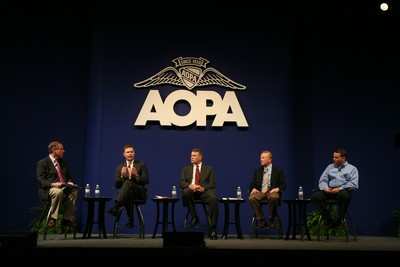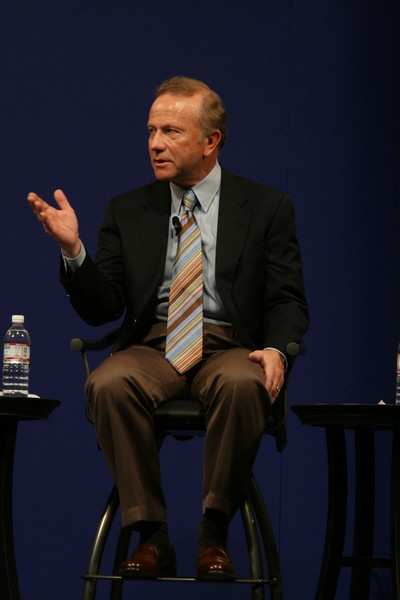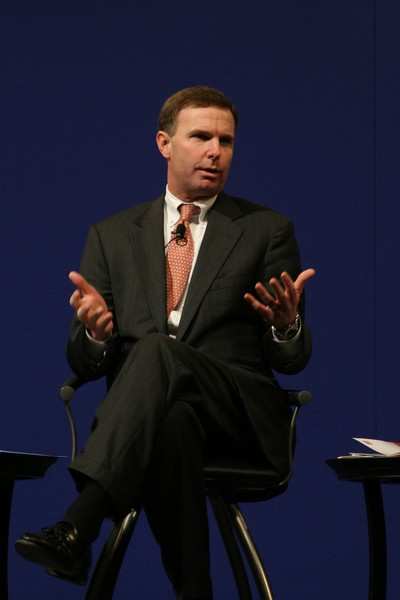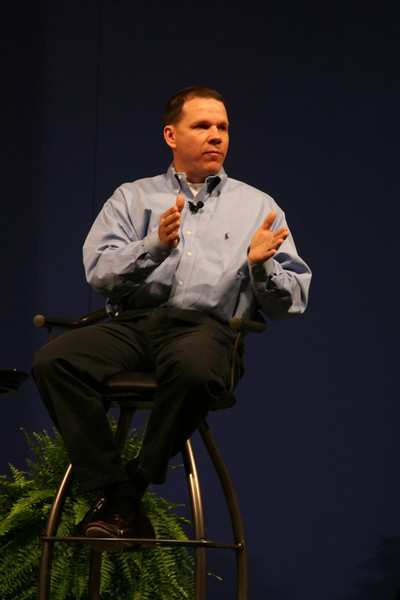Airlines Have A New Target This Time Around
The powerhouses of general aviation presented an equally
powerful, united front at the General Session that kicked off the
AOPA Expo in Palm Springs, CA. Thursday's event opened with AOPA
President Phil Boyer introducing "our biggest issue in the looming
months and year ahead" --- user fees.

Boyer opened the event by pointing out the current $14.2 billion
FAA budget consists of $3.5B in airport improvement, $3.5B in
airport improvement, $2.5B in ATC enhancements and $8.2B for FAA
Operations and $138M for R & D. The budget is funded with 23%
from general taxes and 77% from aviation taxes (GA fuel taxes, and
airline ticket taxes and segment fees.)
This current budget will take the FAA through October 2007 --
but the war has already begun to stop the next generation of user
fees being proposed by the airlines who are attempting to shift $2
billion in fees to general aviation yet still controlling the ATC
system.
Boyer's first guest, National Business Aviation Association
president and CEO Ed Bolen, explained the last budget fight was 10
years ago, in 1997. At that time, low cost airlines like Southwest
were the target of the "Legacy" carriers, such as American and
Northwest. As those two sides squared off, general aviation
remained under the radar.
That war ended in a draw. The ticket tax decreased from 10% to
7.5% and the departure tax was added. Now that airline fares have
basically evened out, they are "closing ranks to fight general
aviation," says Bolen. "We intend to fight this to win."
Bolen also pointed out that one only needs to look at the impact
user fees have had on business aviation clients who fly overseas --
where user fees run rampant, and roughshod, over GA -- to see the
path that has been followed... and realize that one day a simple
joyride around the patch may become a paperwork-intense, fee-ridden
nightmare.
Tom Poberezny, President of the Experimental Aircraft
Association, showed solidarity with his business-aviation
counterpart. "The airlines have targeted general aviation,"
Poberezny said. "They have put a target on the back of business
airplanes."
Poberezny (below) added that effort won't stop with business
aviation... which is why AOPA, NBAA, EAA and GAMA must remain
united to oppose the airlines plan.

Pete Bunce, President and CEO of the General Aviation
Manufacturers Association (GAMA) agreed... calling user fees
"insidious."
He states the airlines are talking about the "onslaught"
and the "darkening of the skies with VLJs" trying to get the FAA to
buy into it. Bunce pointed out the FAA Administrator Blakey
announced at Oshkosh that VLJs will not be a major impediment to
the system.
Bunce also reminded the audience about the 1.3 million jobs --
many high paying ones -- in aviation that benefit the economy...
making the 23% aviation receives from general taxes seem like a
bargain.
Last to speak at the event was the Honorable Sam Graves, US
Representative from Missouri and also a pilot, who serves on the
transportation committee. Graves is on board to fight against user
fees, however his revelation about the knowledge level on Capitol
Hill of the user fees was less than hopeful.

"There is not a whole lot of knowledge in terms of the members
themselves," Graves said, stressing the need for pilots to let
their representatives and senators know how they feel.
Graves also pointed out "piling on a bunch of user fees can have
a devastating effect" on general aviation.
It's obvious, then, that the GA community is staunchly opposed
to user fees... but what about the other side of this argument? The
FAA says it needs money for the much-touted "Next Generation" ATC
system -- that should be a priority, right?
Bolen responds, don't believe the hype.
"I think there's a lot of confusion about what this next
generation (of ATC) is," the NBAA president says. "Nobody knows
what it is, it hasn't been defined."
Defined or not, some elements of the transformation have already
begun. An example is the reduction in vertical separation between
FL290 and FL410 (RVSM), which increases capacity. Another
innovative system hyped by the FAA -- Automatic Dependent
Surveillance-Broadcasting (ADS-B), is undergoing limited testing in
several areas of the US.

How those pieces will come to together, however, is anybody's
guess.
"There aren't a lot of answers," said Bolen (above). "We have a
system that's worked for 35 years. We should not throw out that
system that's worked for a radical new system of user fees based on
a hypothetical modernization plan."
After all, a bank won't lend you money without a concrete
plan... so should the FAA be making plans for fees without a plan
in place as well?
Says Graves "there is no proposal yet on what we're going to do
with the next generation system. They (the FAA) just want the money
now, then they want to figure out what it is they're going to
buy."

Additionally, Graves (above) worries about the accountability of
the money, since it is not a "tax" it would not fall under
government control. Other worries include the cost to put the
bureaucracy in place.
Likely the fund would be cared for by a committee staffed by
mostly the airlines. Can you say fox guarding the hen house?
Poberezny concurs with his peers that "the current system ain't
broke. We are united in this fight."
All speakers at the assembly agreed on one point: any user fee
imposed on corporate aviation is likely to become a "gateway"
fee... and it will only be a matter of time until all of general
aviation will be encompassed.
 ANN's Daily Aero-Term (04.26.24): DETRESFA (Distress Phrase)
ANN's Daily Aero-Term (04.26.24): DETRESFA (Distress Phrase) ANN's Daily Aero-Linx (04.26.24)
ANN's Daily Aero-Linx (04.26.24) Airborne 04.22.24: Rotor X Worsens, Airport Fees 4 FNB?, USMC Drone Pilot
Airborne 04.22.24: Rotor X Worsens, Airport Fees 4 FNB?, USMC Drone Pilot Airborne 04.24.24: INTEGRAL E, Elixir USA, M700 RVSM
Airborne 04.24.24: INTEGRAL E, Elixir USA, M700 RVSM Airborne-NextGen 04.23.24: UAVOS UVH 170, magni650 Engine, World eVTOL Directory
Airborne-NextGen 04.23.24: UAVOS UVH 170, magni650 Engine, World eVTOL Directory







